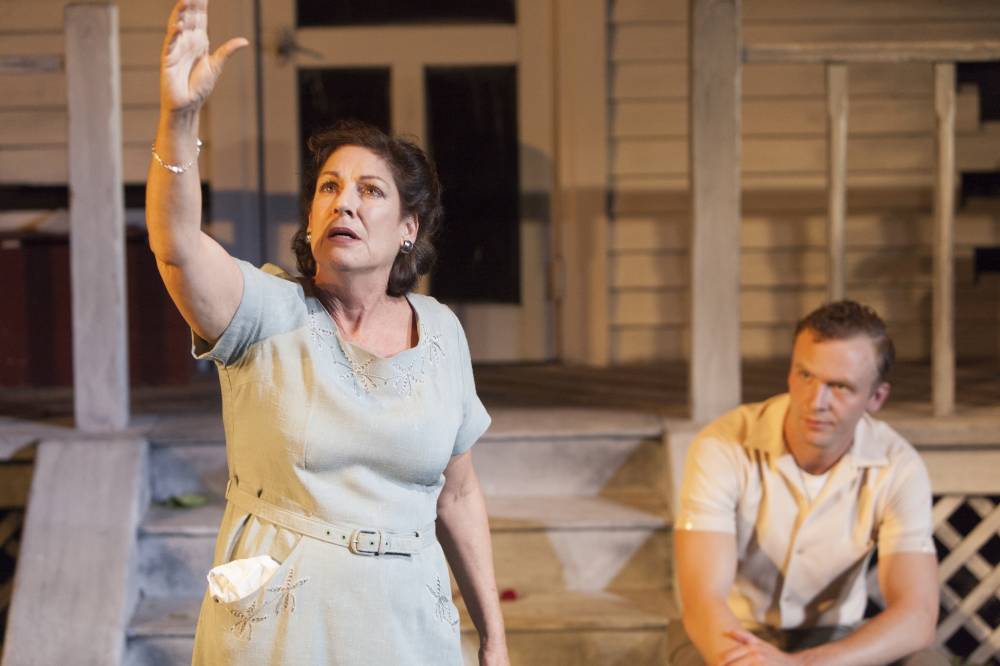Eternity Playhouse, November 5
The new Eternity Playhouse instantly becomes Sydney’s most beautiful theatre. Its size, sightlines, acoustics, stage area, ceiling height, seat-comfort and ambient charm are second to none. It also boasts the most attractive foyer in town, brimming with architectural flourishes, handsome timber, glorious stained-glass windows from its church days and even a bar selling drinkable wine at an acceptable price.
It would have been a travesty had such an exceptional new home for Darlinghurst Theatre Company opened with a dud production. Thankfully Arthur Miller’s All My Sons baptises the new space with rare potency.

Evil justified by being done for the good of a patriarch’s family is a theme that thrums in our media every day. Excavate to the festering base of the motivation for corrupt politicians and rapacious magnates and the “for my family” line is sure to be evoked. So it has been throughout history, and so it was in 1947 when this play opened on Broadway and launched Miller’s golden era.
The play is intricately plotted, and as those lines of plot converge and twist so almost every character is left dissatisfied, darkened, shattered or dead. Miller’s coup de grace was to have two pivotal characters off stage throughout. One is the father of Anne (Meredith Penman) and George (Anthony Gooley) Deever, who has been jailed for faulty engine parts causing airforce pilots to crash during the war. He has taken a rap that should have been Joe Keller’s (Marshall Napier). The other is the missing son of Joe and Kate Keller (Toni Scanlan) and brother of Chris (Andrew Henry), whom Kate keeps willing to walk through the door, despite it being over three years since he disappeared while flying in the war.
These absent characters cloud and haunt the lives of those present, bearing down upon them more and more until they are crushed.
It is a weighty play with meaty roles for all. Toni Scanlan reminds us again that she is one of the brightest jewels on the Australian stage with a Kate that is robust and deluded, resilient and angry, and loving and tortured. Her performance steadily intensifies across the trajectory of the play until shreds us at the end.
Napier acquits himself well in the harder task of playing a character holding a dark secret and for whom emoting is mostly a foreign language. Henry brings fine nuance to Chris, who is eager to forget the war and forge a new life, ideally with his dead brother’s sweetheart. Penman’s Anne is dazzling in charm and range, and rises superbly to the stormy conclusion. The fact that Penman is to leave the production very early in its run for television work is a crying shame on many levels.
Gooley offers a striking portrayal of Anne’s brother, George: a sort of Laertes character hell-bent on justice and revenge, and hang the consequences.
The minor roles all offer some grist for the actors, and Briallen Clarke, Robin Goldsworthy and Iain Sinclair are uniformly good, with Mary Rachel Brown especially maximising role of the bored, sexually frustrated and dry-witted doctor’s wife.
Sinclair has ticked the big boxes of the director’s role: casting, pacing and eliciting performances. Some of his blocking was less adroit, with actors often moving between items of furniture on the Keller’s front lawn more as a matter of avoiding stasis than because of any organic motivation.
Luke Ede’s set irritated somewhat. It implied a somewhat run-down house, when every tenth line of the text hammers home the Keller’s wealth. Perhaps it is also unnecessarily literal, although this is a “straight” production, with American accents and period clothing.
Nate Edmondson’s sound and Nicholas Rayment’s lighting are subtle adjuncts to a gripping production in this exquisite new theatre. Don’t miss it.